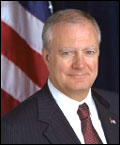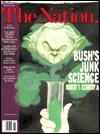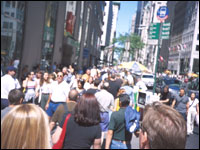In late February, after a star-studded, bipartisan lineup of Nobel laureates and leading American scientists accused the Bush administration of misusing and distorting science to serve political ends, the initial response from 1600 Pennsylvania Ave. was flat-out denial. White House Office of Science and Technology Policy chief John Marburger dismissed the scientists’ complaints as a ”conspiracy report” that cobbled together ”disconnected issues that rubbed somebody the wrong way.” Marburger told the press he had no intention of conducting an internal investigation or passing the report along to higher-ups.

John Marburger.
Perhaps he should have dropped them a memo.
Last week, Marburger’s superiors essentially confirmed, albeit inadvertently, the science community’s charges. On Friday, President Bush let go two members of his Council on Bioethics — a highly regarded scientist and a moral philosopher, both known for advocating research on human embryo cells — and replaced them with three cherry-picked scientists more ideologically aligned with the administration’s conservative anti-stem-cell-research constituency.
The scientist, Elizabeth Blackburn, a biologist at the University of California at San Francisco, told Muckraker she was given the boot for political reasons: Her opinions challenge those of the president and the council’s director, University of Chicago ethicist Leon Kass, who has directly criticized her views in meetings. “Clearly Bush is stacking the council with more like-minded and consonant members,” Blackburn said. “It dramatically changes the balance of viewpoints in the council to have three more people who, based on their track records, are very much more socially conservative.”
The Union of Concerned Scientists — which organized the scientists’ statement of protest to coincide with the release of a report entitled “Scientific Integrity in Policymaking: An Investigation into the Bush Administration’s Misuse of Science” — saw the Bush administration’s dismissal of Blackburn as an offensive and foolhardy move on the heels of the group’s widely publicized allegations. “This clearly adds insult to injury,” said UCS President Kevin Knobloch. “At a time when they should be reaching out to the scientific community and reassuring us, trying to bridge the growing disconnect, they’re indicating that they don’t take our concerns seriously.”

The administration’s alleged hijacking and perversion of science has particularly stark implications for the environment, as pointed out in a recent cover story in The Nation entitled “The Junk Science of George W. Bush” by Robert F. Kennedy, Jr., one of the Bush administration’s most vociferous environmental critics. “The Bush White House is purging, censoring, and blacklisting scientists and engineers whose work threatens the profits of the administration’s corporate paymasters or challenges the ideological underpinnings of their radical anti-environmental agenda,” Kennedy seethed.
Kennedy’s article and the UCS report both invoke example after example of the Bush administration’s efforts to suppress and manipulate environmental science: The U.S. EPA‘s notorious concealment of evidence that air quality in Manhattan was hazardous after Sept. 11, 2001; its decision to replace prominent scientists on an advisory committee on lead regulations with “experts” supported by the lead industry; its delay in releasing research on the damaging effects of mercury on children’s health; its repeated suppression of global-warming science.
But though the Kennedy article was clearly charged with high-octane political rhetoric, the Bush administration can’t write off the scientists’ statement as a partisan attack: It was signed by more than half a dozen high-profile Republicans, including Lewis Branscomb, director of the National Bureau of Standards under Nixon; Richard Garwin, a member of the Presidential Science Advisory Committee under Nixon; W.K.H. Panofsky, a PSAC member under Eisenhower; and Norman Ramsey, science advisor to NATO under Eisenhower.
Russell Train, administrator of the EPA under Nixon and Ford, has also been publicly supportive of the UCS report. “I don’t see it as a partisan issue at all,” Train told The New York Times in a Feb. 19 article by James Glanz. “If it becomes that way, it’s because the White House chooses to make it a partisan issue.”
Kurt Gottfried, chair of the UCS board and a Cornell University professor emeritus of physics, told Muckraker that his organization’s report was itself based on the principles of scientific study: “In science, if you examine a lot of events, you can infer a pattern connecting them that has meaning — even if you don’t have a clear formula or equation explaining them. In this case we examined a large set of incidences — not a small set — and there is a certain commonality to them [revealing] that the Bush administration consistently [censors] scientific evidence and opinions that run contrary to its goals.”
Gottfried added that the report is just a start: “It’s a good effort but certainly not as comprehensive and authoritative as it could be. We can’t subpoena all the witnesses or documents [necessary] to investigate the breadth and depth of the problem — that’s a job for Congress.”
It’s a good thing, then, that Sen. John McCain (R-Ariz.) has agreed to schedule an oversight hearing next week in the Senate Committee on Commerce, Science, and Transportation, which he chairs, to investigate concerns about the Bush administration’s misuse of science. “The hearing will focus on the Union of Concerned Scientists’ report,” said Rebecca Hanks, communications director for the committee. Though it hasn’t yet been officially announced, it is tentatively scheduled for next Tuesday, she said.
“The hearing may not resolve anything, but it will bring more air time to the UCS report and raise public awareness about our concerns,” said David Michaels, one of the signers of the scientists’ statement and former assistant secretary for environment, safety, and health at the Department of Energy under Clinton. And public awareness, particularly in an election year, is the most powerful form of checks and balances.
Blackburn, too, was heartened to hear of the upcoming congressional hearing. “[My dismissal] fits into a larger pattern of which the media, the public, and now Congress are growing ever more critical,” she said, sounding generally upbeat about her exile. “It’s like that old Chinese curse says: ‘May you live in interesting times.'”


